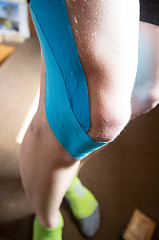Physical therapists use multiple techniques to provide relief from pain and stiffness and help patients heal. One mode of treatment that is commonly used is kinesiology taping. You may have seen this tape on professional athletes, and if you are in physical therapy, your therapist may decide to use it on you. What exactly is kinesiology tape and how is it used? Let’s take a closer look.
What Is Kinesiology Tape?

Kinesiology tape is a special kind of tape that was invented by chiropractor Dr. Kenso Kase in the 1970’s. He discovered that flexible tape that harnesses the interface between the skin and muscles can provide lasting effects in patients suffering from various injuries. Many of the techniques used in kinesiology taping were invented by Dr. Kase.
Kinesiology tape differs from regular athletic tape because it is used to inhibit pain and spasm while facilitating motion. Athletic tape, on the other hand, is intended to limit motion and provide support. Kinesiology tape is also flexible and moves with you, while athletic tape is inflexible.
How is Kinesiology Tape Used?
Kinesiology tape may be used for several different purposes. While there are several theories about exactly how it works, it is believed to improve interactions between skin and underlying structures. It is also believed to inhibit pain pathways, thereby decreasing painful input to the brain. This helps ease pain and decrease swelling while improving muscle performance and function. It can also be used to realign joint positions.
Does Kinesiology Tape Work?
Kinesiology taping is relatively new in physical therapy, and research into exactly how it works is ongoing. However, recent studies indicate that it improves muscular contractions and improves range of motion in the lower back. Other studies have shown that it improved neck pain and motion in patients who were suffering from whiplash.
If you are suffering from an injury, your physical therapist may recommend kinesiology taping as a means of treating your problem. To learn more or to find out whether kinesiology tape may be right for you, contact Denver Physical Medicine today. Call 303-757-7280.
Ready for an expert opinion? Get in touch today!
Discover how physical therapy can help manage scoliosis in mild to moderate cases, along with other ways it offers healthcare solutions. Learn more from Dr. Mansi Dua, DPT, C2 Schroth Certified.
Like this article? Spread the word!
Related Posts
May 15, 2025
Get Moving This Summer: How Physical Therapy at Denver Physical Medicine & Rehab Can Improve Your Health
Get ready for an active summer with physical therapy at Denver Physical Medicine & Rehab.…
April 15, 2025
Spring into Motion: Why Now is the Perfect Time to Start Physical Therapy
Discover why spring is ideal for starting physical therapy. Custom rehab, massage therapy…





